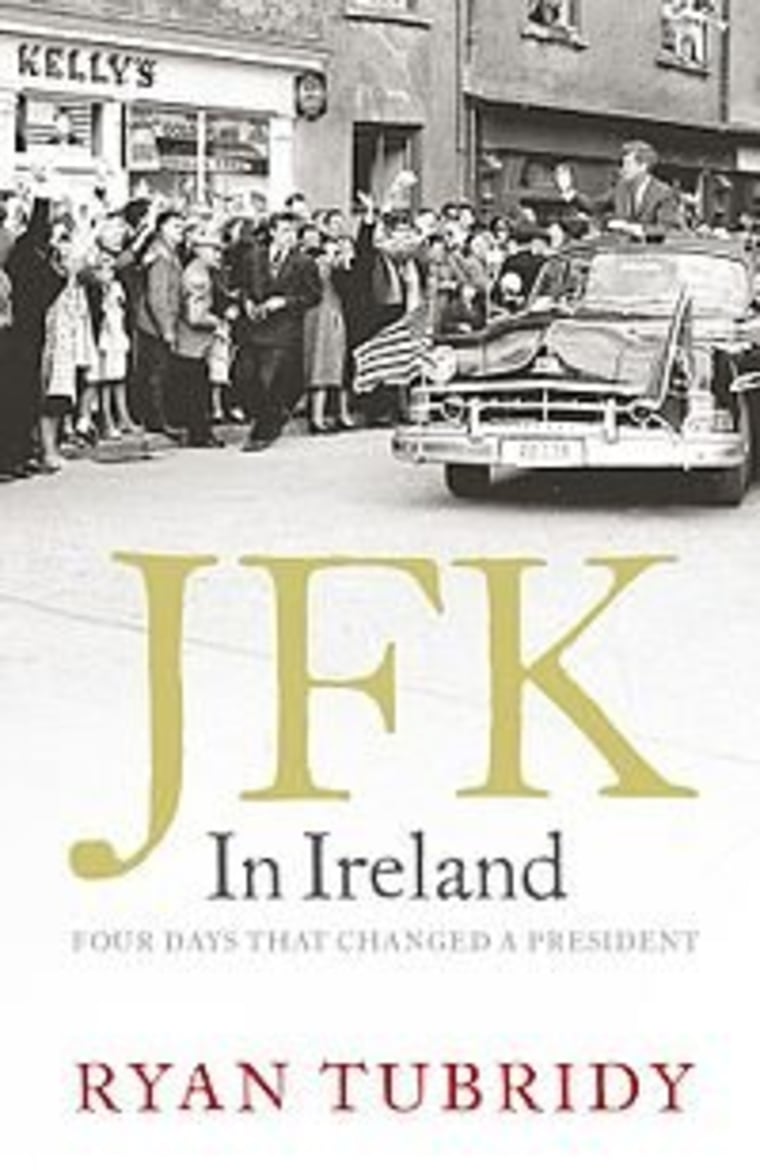By the time President Kennedy stood up to speak, it was clear that he was having a ball. Having chuckled his way through Minihan’s words of welcome, Kennedy proceeded to embrace the mood of the occasion and deliver an almost giddy speech that was as humorous as it was short.
He began by introducing his sisters, Eunice and Jean, to the crowd as well as his sister-in-law Lee, the American Ambassador Matt McCloskey and the head of the American Labour Movement, George Meany, whose parents had been born in Ireland. He then asked the crowd to meet “the only man with us who doesn’t have a drop of Irish blood, but who is dying to [cue roars of laughter], the Head of Protocol of the United States, Angier Biddle Duke.” The President stabbed the air for emphasis on the words “drop” and “dying,” and was clearly enjoying himself.
Biddle Duke stood up to acknowledge the applause that greeted this jovial jibe. He would later remember that the line “got a big laugh from the crowd, and it sent me back to my genealogical tables. I was able to tell him [Kennedy] a month or so later that I had found a great-grandmother by the name of Artelia Rooney, and I wanted him to know it!”
Get more Morning Joe book excerpts
By now the crowd was whooping with delight, laughing along at every turn. Kennedy had them in the palm of his hand as he turned his head towards Duke and declared, “See, Angie, how nice it is, just to be Irish?”
After waiting patiently for his audience to quiet down, the returning son went on to talk about his historical connections with the area. “I am glad to be here. It took 115 years to make this trip. And 6,000 miles. And three generations. And I am proud to be here.”
The crowd clapped their approval.
“When my great-grandfather left here to become a cooper in East Boston, he carried nothing with him except two things: a strong religious faith and a strong desire for liberty. I am glad to say that all of his great-grandchildren have valued that inheritance.”
Once again, the crowd erupted as pride and power permeated the air. They felt as though they were watching one of their own. As if to ram the point home, the man from Pennsylvania Avenue imagined what might have been if his great-grandfather hadn’t emigrated: “If he hadn’t left, I would be working over at the Albatross Company [an animal feed business], or perhaps for John V. Kelly [a local publican].” It was a brilliant stroke of political oratory linking all the way from the highest office on the planet to a bar on the east coast of Ireland, and it proved his advance men had done their job well.
To finish, Kennedy told an apocryphal story about a man from New Ross who visited Washington with his family. To show his neighbors how well he was doing, the man had his picture taken in front of the White House and told everyone that it was his summer home and his neighbors should come and see him. The President concluded his short speech with a line that endeared him to his would-be neighbors for generations to come: “Well, this is our home also in the winter, and I hope you will come and see us.”
It was arguably the most charming of all the speeches the President made in the course of his visit to Ireland and the warm cheers of the crowd set the tone for what was to come.
When it was all over, Kennedy was expected to hop into his car and on to the next venue, but that wasn’t his style. As the eyes of 10,000 New Ross residents watched and waited for him to walk toward the waiting car, there was confusion as he headed in the opposite direction.
Andrew Minihan remembers: “We had been ordered by the American Embassy not to let people shake hands with him because of his back injury. But the man, he himself, wanted to meet people. When he came down off the platform his bodyguards were trying to push him into the car and he said, ‘No, I’m going to meet the people.’ So they said, ‘Right, sir. Come this way.’ And he caught me by the arm and he said, ‘Mayor, we go this way.’ [The people were] absolutely thrilled with him.”
As the President swerved, so too did the crowd and thousands made their way to the nearest crash barrier in the hope of a handshake or at least a closer look. Kennedy stretched into the crowd, using both hands to shake those that were outstretched towards him. He shook every hand he could, but he couldn’t stay long. After fifteen minutes, it was time for him to start the next, brief leg of his journey home.
Not far from the quay at New Ross, a sixty-four-year-old woman and her two daughters were waiting at a rusty gate, the older woman holding onto her daughters’ hands. They were nervous with all the commotion that was going on around them, and why wouldn’t they be? Behind them lay a spread of food, covered in case the overcast afternoon delivered the rain that had been threatening all morning. This was the gate that lad to the Kennedy homestead. This was where the story really began.
Reprinted from JFK in Ireland: Four Days that Changed a President, by Ryan Tubridy. Published by Lyons Press, Guilford, CT. 2011.
